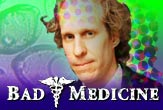Fat Genes: Flawed Logic in New Research Fad

At long last, doctors have discovered a series of genes implicated in obesity, the so-called fat genes. When I heard this I had to immediately rush out to see the actual health report and to check the spelling.
You see, I know all about fat jeans. My neighbor has a pair, and they're a size 64.
Imagine that: Our genes are making us fat , not gross inactivity and an excess of calories from fatty, processed foods. One gene is called Sar1b; another is called GAD2, as in "egad, I eat too much." There are a slew of others, too, such as PPARgamma. Scientists are banging out reports about these as if they were Steven King novels, one after another, each scarier and more hastily written than the one before. Big bucks are to be had for the creator of the anti-obesity pill.
Why do I question the logic? Have you ever heard of a doctor hot on the pursuit of the lung cancer gene so that the public can smoke two packs of Winstons a day and remain cancer-free?
The real problem
Genetics might be at fault for an extremely small percentage of obesity and diabetes, which is why an only extremely small percentage of the world was obese or diabetic during the past several millennia.
But things are really messed up now. Today two-thirds of Americans are overweight, and nearly one-third are obese. Tied to this rise in waistlines is diet-induced diabetes. More than 7 percent of the American population has diabetes by some measures, up from about zero percent a century ago. This is costing the nation more than $100 billion a year in health costs.
Sign up for the Live Science daily newsletter now
Get the world’s most fascinating discoveries delivered straight to your inbox.
The fat genes and diabetes genes didn't materialize out of thin air.
Diabetes was unheard of across the South Pacific and among native populations of North America only a few generations ago. Today, diabetes rates within these populations are as high as 50 percent. Yes, they are genetically vulnerable, but so what? Genes are not the issue.
The culprit has been the introduction of western diets, high in sugar and other simple carbohydrates.
3 ways out
So how do we counter this trend?
- There's the Yankee Stadium approach: The baseball franchise redesigned the House that Ruth Built with wider seats to better accommodate our fat backsides.
- There's the genetic approach: Search for a gene that probably has multiple, important functions and disable it so we can eat a bowl of cookie dough with no adverse weight gain.
- Or there's the boring, inexpensive option: Eat right and exercise.
If I want a long, healthy and comfortable retirement, I'll do the latter but purchase stock in the former two.
Christopher Wanjek is the author of the books “Bad Medicine” and “Food At Work.” Got a question about Bad Medicine? Email Wanjek. If it’s really bad, he just might answer it in a future column. Bad Medicine appears each Tuesday on LIveScience.
Related Stories
More Bad Medicine
- The Appendix: Slimy But Not Worthless
- The Good, the Bad and the Ugly Sperm
- When a Rolling Stone Bounces
- Treating the Symptoms: What's Wrong with U.S. Health Care
- Vitamin Mania: The Truth about Antioxidants
- Zacarias Moussaoui: Wicked But Not Schizophrenic
- Suffocating Trends: Oxygen Bars and Drinks
- Few Clues to High IQs
- Licensed to Kill: Some Doctors are Real Naturals
- War on Bacteria is Wrongheaded
- Soda Sales Go Flat, Industry Fights Back
- Go Ahead, Drink Bacon Grease for Breakfast

Christopher Wanjek is a Live Science contributor and a health and science writer. He is the author of three science books: Spacefarers (2020), Food at Work (2005) and Bad Medicine (2003). His "Food at Work" book and project, concerning workers' health, safety and productivity, was commissioned by the U.N.'s International Labor Organization. For Live Science, Christopher covers public health, nutrition and biology, and he has written extensively for The Washington Post and Sky & Telescope among others, as well as for the NASA Goddard Space Flight Center, where he was a senior writer. Christopher holds a Master of Health degree from Harvard School of Public Health and a degree in journalism from Temple University.









